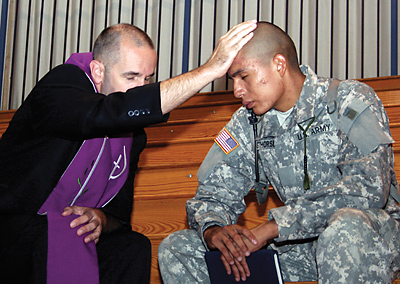
 COLUMBIA—Every Catholic priest who serves the U.S. military as a chaplain receives his training at Fort Jackson in South Carolina.
COLUMBIA—Every Catholic priest who serves the U.S. military as a chaplain receives his training at Fort Jackson in South Carolina.
The Armed Forces Chaplaincy Center, which was dedicated May 6, includes the U.S. Naval Chaplaincy School and Center, Air Force Chaplain Service Institute, and the U.S. Army Chaplain Center and School. The Navy and Air Force moved their schools to Columbia after Congress ordered the military to consolidate its chaplain training programs. Like all chaplains, priests receive basic training in military skills, regulations and procedures, and learn how to minister to all faiths alike in the units where they are assigned.
When their training is complete, however, priests face a different reality than many Protestant or non-denominational chaplains.
There are few Catholic priests to serve a military community teeming with Catholics. Officials estimate that one in four soldiers is Catholic, with only about 100 chaplains to serve them. The Navy has about 60 full-time chaplains to fulfill the needs of the Navy, the Marines, and the U.S. Coast Guard; the Air Force has 70.
“The numbers are devastating,” said Father Edward J. Kelley, a chaplain major in the Army and leader of St. Michael’s military parish at Fort Jackson.
“That’s why we’re losing kids, because they get to places like Iraq and Afghanistan, and there are no priests to serve them,” he said.
Father Kelley is one of three priests assigned to Fort Jackson. Father Brian L. Simpson is director of training at the Naval Chaplaincy School and Center, and Father James A. Hamel is an instructor at the Air Force’s chaplain institute.
Father Simpson said Catholic priests, like rabbis, are called “low density, high demand” chaplains because need for their services greatly exceeds their numbers.
The drastic shortage of Catholic chaplains is simply reflective of the reality in the civilian world, Father Kelley said, where a drop in vocations and an aging priest population has also caused a shortage of priests in many dioceses.
The Archdiocese for the Military Services, USA, is trying to increase the number of Catholic chaplains by offering a co-sponsorship program, which pays half the cost of a seminarian’s education if they agree to go on active duty after serving three years in a parish.
In early August, the Naval Chaplaincy Center was training 14 men, six of whom were seminarians enrolled in the co-sponsorship program.
Father Simpson said recruiting is also a challenge because the priests must be willing to face the possibility of overseas assignments and deployment to combat zones in Iraq and Afghanistan.
All three priests at Fort Jackson have completed at least one tour in these areas. They said chaplains must be able to handle performing their duties in unusual and sometimes uncomfortable places.
“I’ve had to set up my Mass kit on top of the hood of a Humvee,” Father Simpson said. “I’ve said Mass in some strange places.”
In combat zones, they must minister to the wounded and dying, and comfort their comrades. At home, priests who serve at military installations counsel not only stressed-out service members, but also their families.
Father Simpson said they encounter many young people who were raised Catholic but haven’t been practicing their faith. The realities of military life, including homesickness, stress and the possibility of danger, cause many to turn back to the church.
“It’s amazing how many kids we’ll get who haven’t been to confession in ages, like 10 to 15 years,” he said.
Father Kelley also works with many young men and women who are returning to their faith after years of not attending Mass.
“Part of it is the reality of military service, and part of it for some of them is they’re in a position where they get to see priests who are chaplains and know what they’re going through,” he said. “Also, these young people know they could die. They know that kids who sat in the same seats in the past four or five years have died in combat. That does make you think.”
Father Simpson said being present to bring the sacraments to service members is one of the greatest rewards of being a chaplain.
“It’s been a marvelous experience for me to be able to spend a good chunk of my life with some of the most exciting people in the country,” he said. “When you serve in the military, you realize the value of what the priesthood means to the church.
“The question is, what’s going to happen if there are no priests to celebrate Mass? The fewer priests there are in the military, the fewer chances for Catholic personnel to keep in touch with their faith,” Father Simpson said.
